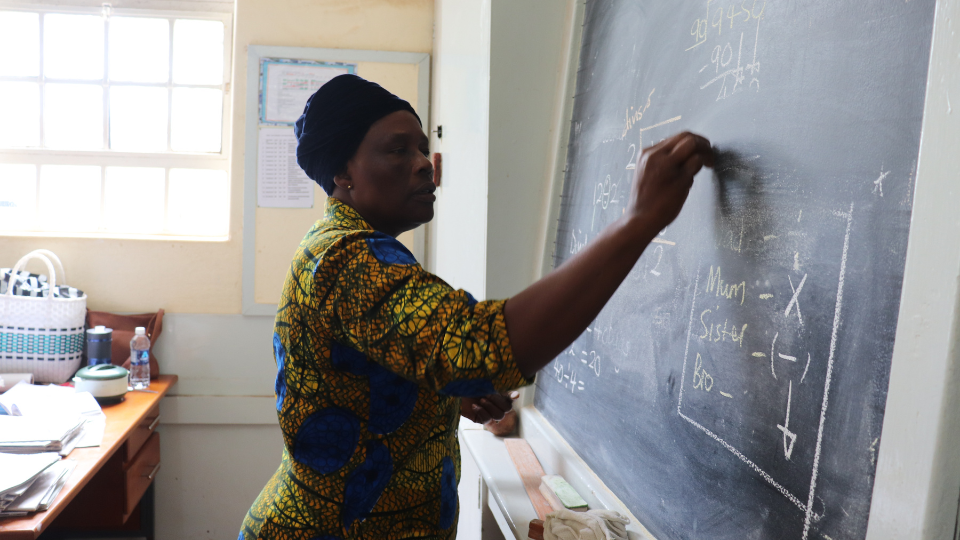The work of all teachers around the world is vitally important, but those working in refugee settings play a particularly crucial role. In this article, the fifth and final in a series on sustainable solutions to the challenges faced by teachers in refugee settings, we explore the necessary preconditions to foster effective teacher management in these contexts. This list of recommendations – which is not exhaustive – are based on insights from four countries from our research with IIEP-UNESCO.
Recommendation 1: Create an enabling policy environment
Enabling policies for inclusion at the international, regional, national, and sub-national level are those which allow refugees to thrive, participate, and contribute to host communities. From our research, two key rights emerged as essential for effective refugee teacher management. Firstly, refugee teachers who often have earned qualifications in neighbouring countries need both recognition of these qualifications and access to the right to work. Secondly, the right to freedom of movement is crucial in enabling refugee teachers to be deployed and in facilitating access to pre- and in-service professional development opportunities.
Recommendation 2: Ensure the active participation of stakeholders at all levels in the development, dissemination and implementation of policies
Allowing for appropriate responses to local challenges in refugee hosting regions requires the engagement of a wide range of stakeholders, including from other sectors, and at all levels in the development, dissemination and implementation of policies. In particular, sub-national stakeholders, including local authorities, teachers and parents, will enable local realities to inform policy development and ensure that local needs and issues are captured.
Recommendation 3: Facilitate government-driven coordination and collaboration between stakeholders
There is a strong need for shared planning and partnership, with development partners, humanitarian stakeholders and other education actors aligning their priorities with those of the government. Government-driven consultation and collaboration between stakeholders should also include consultations at the school and community levels, to capture the voices of those being directly impacted by policies.
Recommendation 4: Reinforce capacities of key government stakeholders at all levels
As progress is made towards inclusion, strengthening capacity may be needed, in both technical and logistical areas. At the national and sub-national levels, support should be offered to education ministries and bodies responsible for teacher management to better understand and plan for the needs of teachers in refugee settings. Strengthening capacity is particularly necessary in dual systems where school are run by education partners rather than the government.
Recommendation 5: Implement a strong data collection system that is responsive to the fluctuation in student populations and can provide disaggregated data
Education systems need timely, accurate data on refugee populations, school enrolment, and teachers. Given that refugee populations may arrive quickly and in large numbers, there are challenges in ensuring that schools have adequate classrooms and teachers, especially when planning and budgeting is conducted at the national level in advance of a school year. Existing education management information systems and teacher management information systems should encompass data pertaining to both refugee learners and teachers, including information about teacher qualifications, and allow safe and responsible disaggregation of data.
Recommendation 6: Formalise financing and resource mobilisation mechanisms at all levels
There is an urgent need for reliable and sustainable funds to allow for effective refugee teacher management and further inclusion, in particular regarding teacher remuneration (which is currently largely covered by unpredictable and unsustainable humanitarian funding). As such, it is essential that any investments from international development and humanitarian partners aimed at supporting refugee teachers be undertaken in partnership with national authorities: this allows for coordinated, joint efforts toward sustained, long-term goals, with more durable ownership from the national government.
At the national level, forms of decentralisation (such as decentralisation of teacher recruitment) (such as teacher recruitment) can facilitate flexible financing approaches for rapid responses to funding needs. Through decentralised processes, local needs can be reported to the central level, with flexible budgeting to allow for a quick responses to challenges in recruiting and deploying teachers, the creation of temporary learning centres, and the recruitment of teaching assistants to support particular populations. assistants to support particular populations.
These insights are drawn from a series of research reports conducted in partnership with IIEP-UNESCO as part of multi-year study. The reports and accompanying policy briefs can be accessed using the links below:










